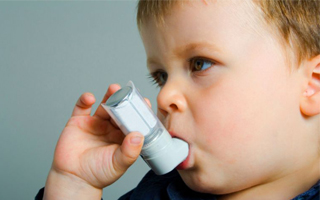Cough is an alarming symptom for parents, most often it is a symptom of a cold, but in some situations it can accompany a completely different disease. Please note that everything is interconnected in the child's body. Cough appears when fast receptors are irritated, which react to chemical and mechanical influences. If a child under one year old rarely coughs, this is normal.
When the baby is completely healthy, he can cough up to 20 times a day, so he is cleared of mucus that has accumulated in the bronchi, trachea, larynx. Most of it can accumulate at night, because the child sleeps motionless, in the morning he coughs much more actively.
Causes of different types of cough in a child
Most often, cough is caused by infectious diseasesthat amaze respiratory system, also appears due to bacteria, viruses. Please note that - this is only a symptom of any disease, it indicates that the child has health problems.
If a child has a cough suddenly, this may indicate that he is inhaling foreign body in the area of \u200b\u200bthe bronchi, trachea, in this situation you need to call an ambulance. In some babies, a coughing fit can be triggered by cigarette smoke, hot, dry air.
The main characteristics of a child's cough
1. The cough can last for weeks, months, sometimes years. Can be distinguished acute form, protracted, worries the child for more than a month, chronic for more than 3 months.
2. The cough can be mild, in some situations, tearful, comes to vomiting, and there may be hemorrhage in the eye area.
3. The doctor pays attention when the child coughs the most - in the morning, at night, in the afternoon.
4. The cough may be dry or wet. If dry, it appears due to the fact that receptors are irritated, sputum leaves poorly, is viscous. Wet appears due to the fact that a lot of phlegm accumulates, the child can cough up, gurgling is heard in the respiratory system.
5. The type of sputum is also taken into account, its production occurs at the expense of tracheal, bronchial cells. If the baby is healthy, sputum will not come out, only when he inhales a large amount of dust, smoke, the ligaments begin to strain strongly.
6. In a child, the cough can be paroxysmal, which is characteristic of whooping cough, it is also intermittent in bronchitis, if the vocal cords are inflamed, the cough is hoarse, when the larynx is affected, he is barking.
7. Are there any additional signs - heat body, wheezing, intoxication.
The danger of different types of cough for a child
It is important to consult a pediatrician in time if the cough starts suddenly and does not go away for a long time. A cough, which is accompanied by wheezing, is especially dangerous, and nocturnal paroxysmal types of cough, when the sputum turns green, has blood. A doctor should be called at home if you have a high fever cough.
How does a child's cough manifest?
It is important to know everything about this symptom. Medicines are used only if the cough is dry, when the child has pharyngitis. If the child's cough is wet, and he feels normal, he can clear his throat without problems, this indicates that the sputum is removed normally, special treatment in this situation is not needed.
Note that coughing can be a defense mechanism in a child's body, it clears the respiratory system when a lot of mucus builds up. It is necessary to treat it with the help of medicines only when it does not allow the child to live fully.
Causes of the main types of cough in a child
With ARVI, the nasopharynx is most often inflamed, so pharyngitis appears, the larynx can also become inflamed, this speaks of laryngitis, false croup. At first, you can notice that the cough of very dry sputum does not separate at all, after, depending on the disease, it becomes barking, if the child has laryngitis or wet with bronchitis, pneumonia.
A wet cough is rare, when it appears immediately, most often it goes dry. In cases of bronchitis, moist wheezing is observed, it is important to exclude pneumonia, which is very dangerous for the child, and start treating it as early as possible.
A cough of a spastic nature occurs with bronchial asthma, in young children, with bronchiolitis. Such a cough is unproductive, obsessive, and whistling.
If the cough lasts a long time in adolescence or school age, we can say that the child has tracheitis, of a viral origin. With these diseases, coughing is very painful, the mucus is dense, it resembles whooping cough.
When a child's cough is often repeated, this speaks of. First, a cough develops when respiratory infectionafter gradually can be moisturized, lasts more than two weeks. With obstructive bronchitis, the cough is spastic, over time it becomes moist, the body temperature rises greatly.
In cases of chronic pathological diseases of the respiratory tract, the cough is constantly wet, especially aggravated in the morning, the child gets up and must definitely clear his throat. If the baby has a persistent cough, the sputum is viscous, an obstructive process in the bronchi may develop, with this disease there are problems with the digestive system.
Thus, a child's cough can be different - wet, dry, manifest at night or in the morning, it is important to monitor all the symptoms, they indicate the disease. With any cough, it is important to examine the child so that it does not become complicated and does not develop into a severe chronic form. Most often, children subsequently have bronchial asthma for life.
A cough can bother a child at night, even if he only occasionally coughs during the day. Regardless of the root cause, coughing fits in a child at night are due to the fact that in a supine position, mucus comes out more difficult, lingers in the airways, and the child's weak muscles are unable to push it out. First of all, note that this reflex does not always indicate illness - it may be a normal physiological response to irritation of the airway receptors. and young children may occur to clear the airways of dust, mucus, or if the child chokes slightly on saliva.
Children who have teething coughs especially often. This is usually harmless and the child clears his throat easily.
However, in cases where he often bothers with attacks that intensify during sleep, parents should pay attention to the child's health, as this may be a symptom of some diseases. This makes it difficult for children to sleep, which affects their mood, well-being and health in general.
Types of cough and its causes
Sleep coughs can be wet or dry. Wet, or wet, is called a cough with sputum, which distinguishes it from dry.
The most common cause of the symptom is a viral or bacterial infection.
In this case, dry or moist cough depending on the stage of the disease. usually appears at the very onset of a cold or flu, may be accompanied by a sore throat and chest pain.
Due to the secretion of mucus during the first days of a cold, it is replaced by moist, but then the mucus can thicken again, as a result of the multiplication of bacteria and the loss of moisture in the body.
A dry, wheezing cough can be a symptom of the flu. If, during the treatment of a dry cough, it is replaced by a wet one, we can say that the child is recovering, and the opposite process (wet became dry) indicates complications.
Additional factors
The factors that cause dry cough can be both infectious and non-infectious.
Infectious causes:

Non-infectious causes:
- inhalation of a small object, or getting a piece of food, small parts of toys into airways... In this case, the child is simply trying to clear his throat, clear the airways. At the same time, the cough reflex begins abruptly, and in a severe case can lead to suffocation. It is urgent to put the child face down on his knees, and make several moderately intense blows in the area between the shoulder blades;
- dry and cold air in the children's room, tobacco smoke, dust.
A wet cough can be caused by allergies, tuberculosis, pneumonia, bronchitis and even a runny nose. The reasons can be judged by the characteristics of the mucus separated during this:
- a large amount of sputum speaks of bronchitis, tracheitis;
- a rusty hue of mucus gives pneumonia;
- a large amount of liquid transparent mucus is typical for the first days of ARVI, influenza;
- vitreous sputum is a sure sign bronchial asthma;
- sputum with blood occurs in the later stages of tuberculosis;
- purulent sputum - a symptom acute infection, an abscess of the lungs or bronchi.
All of the above causes can cause coughing fits at night in a child. Thus, among the common reasons are the following:

But more often than not night cough cause all the same colds, however, at night in the supine position, the seizures are more pronounced, which worries attentive parents.
You should not try to diagnose a child on your own based on your observations - to accurately determine the reasons, the doctor uses different examination techniques, you may need a bacteriological culture of the separated sputum.
Revealing the true causes of the disease is the key to successful treatment.
If parents are worried about a child's cough at night, and they do not know what to do, the best option would be to seek help from a polyclinic, where they will conduct all the necessary research and give recommendations on the treatment and care of the child.
